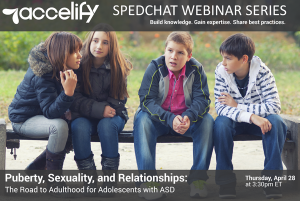Webinar Recap: Puberty, Sexuality, and Relationships: The Road to Adulthood for Adolescents with ASD
May 3, 2016
 Dr. Wes Dotson joins Accelify to discuss puberty, sexuality and relationships for adolescents with ASD.
Dr. Wes Dotson joins Accelify to discuss puberty, sexuality and relationships for adolescents with ASD.
Last week, in celebration of Autism Awareness Month, we had the honor of hosting Dr. Wes Dotson of the Burkhart Center for Autism Research and Education at Texas Tech University for a special webinar on an important topic: puberty, sexuality, and relationships for adolescents with ASD
During this webinar, doctor Dotson addressed not only the challenges individuals with autism face as they go through puberty and mature into adults, but the challenges families and educators face in teaching these young people the skills they need to navigate puberty and develop meaningful and satisfying relationships, both romantic and platonic.
Talking about puberty and sexuality with adolescents can be awkward
Dr. Dotson commenced the webinar by addressing the elephant in the room: the fact that puberty and sexuality are awkward topics to broach with all adolescents, whether or not they have disabilities. But he believes that being willing to engage in open and candid conversations about such topics with young people on the spectrum is critical to supporting them in living meaningful fulfilling lives.
While there is often a focus on teaching students with ASD other life skills they will need for independence, teaching them about sex and relationships often goes by the wayside simply due the discomfort many adults feel when broaching such topics. Getting over the awkwardness of talking about sex is perhaps the first and most important step in effectively preparing adolescents with autism to have satisfying reciprocal relationships. Afterall, Dr. Dotson advises, adult independence and happiness is, at its core, built upon the ability to develop and maintain satisfying relationships. And if it is our jobs as educators, service providers and family members to help adolescents with ASD mature into adults who live happy and independent lives, it is critical that we move past our own discomforts in order to equip them with the skills they will need to do so.
 Teaching adolescents with ASD about puberty and sexuality can help keep them and others safe
Teaching adolescents with ASD about puberty and sexuality can help keep them and others safe
Knowing about one’s own sexuality and what to expect during puberty along with having the skills necessary to effectively navigate this territory are not only the building blocks of independence and happiness later in life, but they are also a matter of safety. Not only are individuals with disabilities more likely to be the victims of sexual abuse and exploitation, but they are also more likely to stalk, pursue longer, ignore other partner’s interests/needs, stare, inappropriately touch, and engage in inappropriate behaviors in public. And as young people with disabilities get older, the consequences for inappropriate behavior behavior become more severe. Ensuring that sexual education and social learning are an active part of education for all adolescents with autism is not only in their best interest, but in the interest of everyone.
There are effective, evidence-based resources out there for adolescents with ASD about puberty and sexuality
The good news is that “if you can teach a child with autism how to tie his shoes, you can teach a teenager with autism how to ask for a date,” said Dr. Dotson. “Good teaching is good teaching,” he continued. And when it comes to teaching adolescents with ASD about sexuality , there is no need to reinvent the wheel. Dr. Dotson discusses how specific strategies used to teach other kinds of skills and behaviors can be just as effective when it comes to teaching about sexuality and relationships. Interventions like visual supports, script fading, and social stories have all been used to successfully teach these skills. In tandem with other strategies, like providing young adults with autism opportunities to participate in community activities and to learn and practice skills in the environments where they would most likely occur in real life, adolescents with autism can learn the social skills they need to develop meaningful and reciprocal relationships with their peers and can help them avoid misunderstandings and even trouble with the law. Dr. Dotson provides a complete list of resources at the end of his presentation
To learn more about how to support adolescents with autism through puberty and teach them the skills they will need to develop satisfying relationships, you can watch last week’s webinar in its entirety by clicking here. You can also view the webinar slides below.